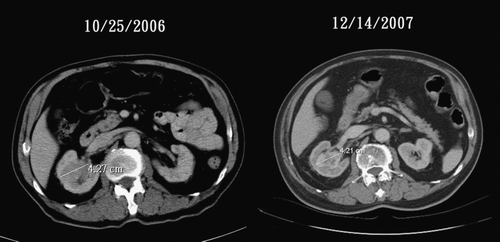To the Editor
Sorafenib is a multi-kinase inhibitor and is effective in the treatment of metastatic renal cell carcinoma (RCC) Citation[1], Citation[2]. However, the median treatment duration for RCC in published articles is around 24 weeks Citation[2]. But for responsive patients, no published reports have discussed when sorafenib should be discontinued. We report a patient with metastatic RCC who responded to treatment with sorafenib plus chemotherapy, and the treatment was discontinued at his own insistence. Thirty months after the first dose of sorafenib plus chemotherapy and 15 months after discontinuing treatment, he was still alive without disease progression.
An 81-year-old man presented with severe pain in his right hip joint and underwent hip joint replacement in October 2006. A specimen from the resected hip joint was sent for pathologic studies and was diagnosed as metastatic renal cell carcinoma with bony metastasis. A computed tomographic (CT) scan () revealed a right kidney tumor and enlarged calyx, so he was referred to our medical oncology department for treatment. Because of the patient's age, sorafenib was administered at a reduced dosage of 400 mg/day to avoid toxicity. One month later, vinblastine (8 mg/m2) plus fluorouracil (500 mg/cycle) were given as conjunct medication and repeated every two weeks. Bisphosphonate (pamidronate) was also given with 90 mg/month. The patient tolerated the treatment well and the disease remained stable without further metastasis for 15 months, when he insisted on stopping the medication. Fifteen months later, we contacted him and he was healthy with an ECOG performance status of 0-1.
One of the main problems of using targeted therapy in metastatic cancer is whether the medication should be discontinued when the clinical status is stable or the patient is in remission. In most cases, patients are treated until disease progresses Citation[3]. Therefore, it's difficult to determine when and whether to stop the medication. We also assumed that the addition of chemotherapy to these targeted medications might lead to better disease control and longer progression free intervals Citation[4]. The cost of treatment is another problem. In metastatic RCC, the costs for sorafenib are around US$30 000–40 000. This usually prevents a patient from taking these medications without limit. Based on this case, we are particularly interested in the cost-effectiveness of treatment, an aspect which interests insurance authorities the most.
Presently, the eradication of metastatic RCC by available medications is still a long way off. Lower costs and longer survivals with better control remain the main goals of treatment.
References
- Ratain MJ, Eisen T, Stadler WM, Flaherty KT, Kaye SB, Rosner GL, et al. Phase II placebo-controlled randomized discontinuation trial of sorafenib in patients with metastatic renal cell carcinoma. J Clin Oncol 2006; 24: 2505–12
- Kane RC, Farrell AT, Saber H, Tang S, Williams G, Jee JM, et al. Sorafenib for the treatment of advanced renal cell carcinoma. Clin Cancer Res 2006; 12: 7271–8
- Bracarda S, Caserta C, Sordini L, Rossi M, Hamzay A, Crino L. Protein kinase inhibitors in the treatment of renal cell carcinoma: Sorafenib. Ann Oncol 2007; 18(Suppl 6)22–5
- Gollob JA. Sorafenib: Scientific rationales for single-agent and combination therapy in clear-cell renal cell carcinoma. Clin Genitourin Cancer 2005; 4: 167–74

